- Home
- Michael Bond
Paddington’s Finest Hour Page 5
Paddington’s Finest Hour Read online
Page 5
At which point another trumpet fanfare signalled the end of the programme, and as the studio audience rose to their feet and applauded, Mrs Bird voiced the thoughts of all those at number thirty-two Windsor Gardens.
“I do like happy endings,” she said, “and those that leave you with a taste of marmalade in the mouth are the nicest ones of all.”
Chapter Six
A VISIT TO THE CLEANERS
WHETHER OR NOT Mrs Bird was right or wrong about their next-door neighbour (and it would have been most unlike her to be wrong), despite their sharing in the prize for the Best Spring Garden, it was Mr Curry’s display that drew the most attention and rubbed fresh salt into the wound every time he was seen chatting to an admirer.
People stopped to take pictures of it on their mobiles as they went past on their way to work, and again on their way home. Others with children stopped by during the day, and one or two even asked Mr Curry for his autograph. The crowning insult of all was when a passer-by said to Mr Brown, “I bet you’d like a garden like the one next door.”
There was only one way to cope with the situation and that was to grin and bear it. In any case it was spring-cleaning time at number thirty-two Windsor Gardens and with Jonathan and Judy home for the half term break, it was a case of all hands to the grindstone. That being so, Paddington offered to take a load of clothes to the dry cleaners in his shopping basket on wheels, and one way and another, with the help of Mrs Brown and Mrs Bird, in no time at all it was full almost to the brim.
“There are times when I really don’t know what we would do without a bear in the house,” said Mrs Bird, as she bustled into the kitchen after saying goodbye to him and set to work on her saucepans. “He’s always so anxious to be of help.”
“I bet he wouldn’t be half as keen if he was a grizzly bear,” said Jonathan.
Judy gave a groan. “Just for that, you can help me polish the silver,” she said.
“I would if I could,” replied Jonathan airily. “But I promised Dad I would have a go at his lawnmower. The blades need adjusting and it isn’t a job for girls.”
Mrs Bird pointedly gave vent to a loud sigh.
To be honest, when she waved goodbye to Paddington at the front door she felt a nagging worry as to whether or not she was doing the right thing in letting him go off by himself, but she took comfort in the fact that he was a resourceful bear, and if he had a problem he could always call on Mr Gruber for help on the way.
No doubt he would be stopping off at his best friend’s antique shop for his elevenses anyway, so with strict instructions to unload his basket at the cleaners first, otherwise their promise of NO DELAY - BACK IN A DAY I would be rendered null and void, she waved a final goodbye.
The Browns’ housekeeper ran what Mr Brown liked to call a ‘tight ship’, meaning she seldom left anything to chance, but this happened to be one of those occasions when she did. Had she waited a little longer at the front door to see Paddington safely on his way, her eagle eyes would undoubtedly have spotted their next-door neighbour lingering near his front gate, but Paddington was having trouble with his steering, and it wasn’t until he reached the pavement that he heard a familiar voice calling his name.
“And where might you be going, young bear?” asked Mr Curry.
“I’m doing what Mrs Bird calls ‘The early bird catches the worm,’” said Paddington. “I’m taking some clothes to Samuels the cleaners. Mr Samuel is expecting me.”
Mr Curry rubbed his hands in invisible soap, as was his habit when he was about to ask a favour.
“I thought as much,” he said. “Dear lady. She does it around this time every year. You could set your clock by it. I was hoping to catch her, but if you are going to the dry cleaners, then you are in a position to do me a small favour.”
Reaching down he picked up an old carrier bag bulging at the seams. “It’s all to do with my winning the prize for the Best Spring Garden in the area. One of the big dailies has got to hear of it and they are sending their top photographer to take a picture of me tending it after dark. I shall need my best suit cleaned for the occasion and I know you won’t mind adding it to your pile of old clothes. I shall make sure you are handsomely rewarded. I want to look my best in the picture, so it’s a case of no expense spared.
And before Paddington had the chance to open his mouth, Mr Curry had placed the carrier bag on top of an already over-laden basket on wheels and disappeared into his house, without so much as a ‘thank you’.
Alarmed by the fact that the delay might make him late for the dry cleaners, Paddington did the journey in record time. To his relief, Mr Samuel was ready and waiting when he arrived and he helped unload the contents of the basket on wheels onto his counter.
There was a strong smell of mothballs coming from Mr Curry’s bag, and when Mr Samuel removed the suit an actual moth flew out. “If you want my opinion,” he said, “he’s only just put those mothballs in. Keep an eye out for more. It’s bad for business.”
The suit was on a wire hanger and he held it up to the light. “As for this,” he said dubiously, “it’s a long time since I saw anything like it. Look at the shape of the collar for a start. If you ask me it will fall to pieces with shock if I start cleaning it.”
“It belongs to our neighbour, Mr Curry,” said Paddington. “And he needs it for a special function after it gets dark.”
“That’s something,” said Mr Samuel. “I wouldn’t fancy seeing it in daylight. On the other hand you get to see all sorts of unexpected things in this business.”
Reaching further along the counter he picked up a pair of blue jeans and held them up for Paddington to see.
“Take these,” he said, pointing out several holes. “It’s what’s known as being distressed.”
Paddington gave them a hard stare. “I’m not surprised,” he said, “I’d be very distressed if I had a pair of trousers like that.”
“That’s as maybe,” said Mr Samuel. “But you’d be surprised how many people take the opposite view. They treat it as a work of art. I know a good many who would pay through the nose to get their hands on a pair like these. The more holes there are the better – especially in the knee department. Which doesn’t make our job any easier. You try cleaning something that’s full of holes to start with.”
“How do you make a hole in a pair of jeans?” asked Paddington.
“It’s not as easy as it might sound,” said Mr Samuel. “Denim stands up to a lot of rough treatment. Sandblasting is very popular. But any way you like, provided it ends up looking like fair wear and tear and hasn’t been cut out with a pair of scissors. Don’t tell me you want to have a go at doing it.”
“Bears don’t wear jeans,” said Paddington, avoiding a straight answer. “And even if I did I don’t think I would want a pair looking like those.”
He didn’t wish to be rude, but there were times when it was hard to understand the way some humans behaved.
“It is a form of protest about life in general, with all its rules and regulations,” said Mr Samuel. “Or in some cases it’s a perverted form of jealousy. A way of pointing out the difference between the ‘haves’ and the ‘have-nots’. Saying in effect, ‘It’s all very well for you showing off your wealth. Just look at me – dressed in rags!’”
Looking out of his shop to make sure the coast was clear, he lowered his voice. “No names, no pack drill as they used to say in the army. But some of my customers have a next-door neighbour who is very like that.”
“You mean Mr Curry?” said Paddington.
“If the cap fits,” said Mr Samuel. “I have heard tell about what happened in the front-garden competition. These things get around. Bad news travels fast, but business is business. Tell him I’ll have his suit ready to be picked up by four o’clock this afternoon.”
And without further ado he brought the conversation to a close as he called for an assistant and began making a list of the various other items Paddington had delivered.
&nb
sp; Paddington’s next port of call was the bakers in the Portobello Road where he had a standing order for buns, and then a few doors down the road to the antique shop where Mr Gruber promptly set to work making the cocoa for their elevenses. As he did so he listened carefully to Paddington’s outpourings on the subject of men’s clothing and Mr Curry.
“I only hope his suit turns up trumps,” he said. “I hate to say it, but following the principle of treating others as you would wish to be treated yourself, I suggest you collect it for him on the dot, and if you make sure it’s gift-wrapped you might earn some Brownie points into the bargain.”
Having thanked Mr Gruber, Paddington hurried back to Windsor Gardens in order to lend a paw with the spring-cleaning, and it was while he was helping Jonathan adjust the lawnmower in the miniature workshop attached to the garage that he had one of his inspirations and, as luck would have it, Mr Brown was scrupulously neat with his tools, and there, clipped to the wall in front of him were all those needed for what he had in mind – updating the holes in Mr Curry’s suit.
It was really a case of following Mr Gruber’s advice and doing unto others what you would have them do to you, and it involved him in a certain amount of travelling to and fro, not to mention the time spent in Mr Brown’s workshop, so that it was dark by the time he had finished work.
Paddington left the parcel on Mr Curry’s doorstep, pressed the doorbell, and then made for home as fast as his legs would carry him.
The subject was never mentioned again, but the newspaper man must have turned up later that night and got what he wanted, for a full-page picture appeared in the garden section of their weekly magazine under the title HOW TO MAKE YOUR OWN FAMILY SCARECROW. Fortunately the designer remained uncredited.
Soon afterwards Mr Curry was to be seen dismantling his front garden. The most ignominious moment came when he filled a wheelbarrow full of plants and, watched over by a robin redbreast, delivered them back to their rightful home.
Chapter Seven
PADDINGTON’S FINEST HOUR
“WHAT’S A CONTORTIONIST?” asked Paddington, glancing through a theatre programme Judy was looking at. “I don’t think I have ever met one of those before. We didn’t have any when I was small, and I didn’t come across one in the Home for Retired Bears.”
“I’m not surprised,” said Jonathan. “A contortionist is someone who gets himself or herself into a funny position to entertain others. I don’t suppose there are many theatres in Darkest Peru, and if you’d had one in the Home for Retired Bears it would probably have meant he was stuck like it for good.”
“The one on tonight’s bill is called ‘Corkscrew Charlie’,” said Judy.
“I once saw him on a Royal Command Variety Performance,” said Jonathan. “Even the Queen looked impressed when he unwound himself in order to take a bow.”
Paddington considered the matter for a moment or two. Sometimes the things human beings did for pleasure seemed very strange to his way of thinking. “It seems a long way to come just to see someone turn himself into a corkscrew,” he said. “You would have thought it would be easier for him to come to Windsor Gardens.”
“I know exactly how you feel, Paddington,” said Mr Brown, leading them at a fast pace along a softly lit corridor. “But we haven’t come all this way just to see Corkscrew Charlie. There are lots of other acts besides him and they couldn’t all come to us at once. That’s why it’s called a Variety Show. They were very popular when I was a boy.”
“There’s Fred and Mabel with their performing Pekinese dogs,” said Judy, pointing to a picture on the wall. “All twelve of them.”
“A laugh a minute!” broke in Jonathan, quoting from his programme.
“It sounds very good value,” admitted Paddington.
“And there’s a team of chimpanzees doing a bicycle act,” said Judy. “Fifteen of them form a giant pyramid on the handlebars of one bicycle! I bet you’ve never seen anything like that before either. But they don’t appear until somewhere near the end of the show.”
“There’s something for everyone,” said Mr Brown. “Non Stop. Just like it must have been in the old days when practically every town in England had its own music hall, and entertainers similar to the ones we’ve been talking about were able to travel the country doing the same act all their life.
“Nowadays, one appearance on television and that’s it – finished with. Millions of people have seen it and they have to find something new.”
Rounding a corner they met up with a group of other latecomers being held at bay by an usherette selling programmes outside a narrow doorway, and he slowed down to draw breath.
“Are you sure we’re doing the right thing, Henry,” whispered Mrs Brown. “It’s rather a lot for a small bear to take in at one go. I can’t help remembering the day he came to live with us and he came across a bathroom for the first time in his life. Think what a disaster that was.”
Paddington looked at the others enquiringly.
“Jonathan and I turned the water on and left you to it,” said Judy.
“Mistake number one,” said Jonathan. “You were so busy trying to write your name on the steamed-up window you forgot to turn it off and it ran over the side of the bath.”
“The first we got to know about it was when water started dripping on our heads downstairs,” said Mrs Brown. “It’s a wonder the whole ceiling didn’t come down.”
“Oh, dear,” said Paddington. “But it wasn’t the first bath I had ever seen. They had one in the Home for Retired Bears. It was on the roof. You should have seen the queue outside on a Friday evening. It went all round the block. So I gave up in the end. Besides, they never changed the water and Aunt Lucy said it wasn’t good for a young bear. It had gone a funny colour and didn’t smell very nice.”
“I hope he hasn’t brought any ‘you know whats’ under his hat,” whispered Judy, hastily changing the subject as the queue ahead of them noticeably edged away. “We don’t want a repeat of the last time we took him to a theatre. If you remember, he dropped a marmalade sandwich on a man’s head in the stalls during the interval.”
“Shall we ever forget?” said Mrs Brown.
“I doubt very much if the man it landed on will either,” broke in Mrs Bird. “He’s probably still frightened to go out after dark without a hat.”
“There’s no fear of that happening again,” said Mr Brown. “We were all high up in a box then alongside the upper circle and accidents happen even in the best-regulated theatres.”
“I don’t remember Dad saying that at the time,” whispered Jonathan.
The Browns were in a part of London they had never visited before, and it had been touch and go as to whether or not they would make the theatre in time. The last hundred yards or so after Mr Brown had found somewhere to park the car had been frantic.
Jonathan looked up from his programme. “There’s a parrot called Percy who has a spot all to himself,” he said. “He walks along a tightrope blindfolded while he recites ‘The boy stood on the burning deck’ followed by ‘To be or not to be’. In the old days he probably flew on to his next engagement.”
“Nowadays he has to do a matinee every Wednesday and Saturday,” added Judy. “I expect it’s to make ends meet. There’s a note at the bottom of the programme saying someone from the RSPCA is present at all times.”
“That certainly didn’t happen in my day,” said Mr Brown. “It’s good to hear.”
Beyond the front of the queue there was a cacophony of sound as trumpets and trombones competed with cornets and saxophones, punctuated by an occasional burst of frantic drumming.
“That’s the orchestra tuning up,” explained Judy.
“I hope they get it right by the time we’re inside,” said Paddington.
A titter came from several people ahead of them.
“They will,” said Judy. “Just you wait and see.”
Paddington took a closer look at some of the pictures on the wall. “I think I might
get a programme while we’re waiting,” he announced. “It sounds very good value.” And before the others had a chance to stop him he had disappeared into the queue ahead of them.
“Oh, dear,” said Mr Brown. “I was hoping three would be enough to go round. I’m afraid he’s going to be in for a shock. They don’t come cheap these days.”
“I strongly suspect we’ve encountered it already,” said Mrs Bird, as she detected the sound of raised voices. “There’s a bit of a commotion going on.”
“It seems they’ve only got the souvenir programmes left,” said a man next to her. “And they’re eight pounds fifty. We’ve reached a bit of an impasse. The young bear gentleman wants a receipt for his money and the girl won’t give him one.”
Mr Brown heaved a sigh as he reached for his wallet. “In for a penny,” he said. “In for a pound.”
“He don’t half have a hard stare when he likes,” said the usherette when he rescued Paddington. “Never seen anything like it before.”
“He only uses it when the occasion merits it,” said Mr Brown pointedly.
“The great thing about a variety show like this,” he continued, as the crowd ahead of them began to move forward, “is you need to be as close to the action as possible, so I’ve reserved six seats in the centre of Row A in the stalls.”
“Is that wise, Henry?” said Mrs Brown. “You know what Paddington’s like. All it needs is a magician inviting a member of the audience onto the stage and he’ll be up there like a shot – even if the man does happen to be sawing someone in half.”
“Especially if he’s sawing someone in half,” murmured Jonathan as they hastily took their seats.
“There isn’t a magician on the programme,” said Mr Brown. “I made sure of that when I was doing the booking.”

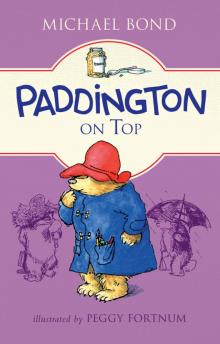 Paddington on Top
Paddington on Top Paddington Takes the Test
Paddington Takes the Test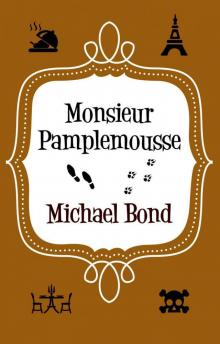 Monsieur Pamplemousse (Monsieur Pamplemousse Series)
Monsieur Pamplemousse (Monsieur Pamplemousse Series)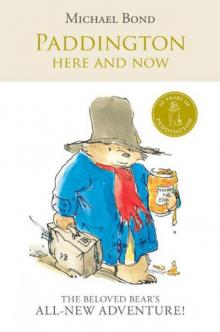 Paddington Here and Now
Paddington Here and Now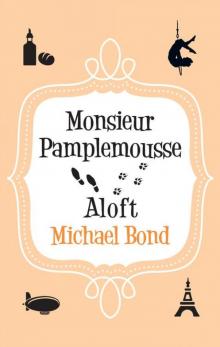 Monsieur Pamplemousse Aloft
Monsieur Pamplemousse Aloft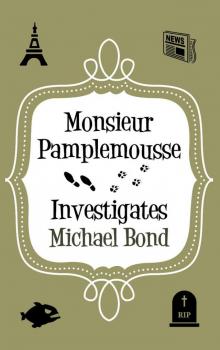 Monsieur Pamplemousse Investigates
Monsieur Pamplemousse Investigates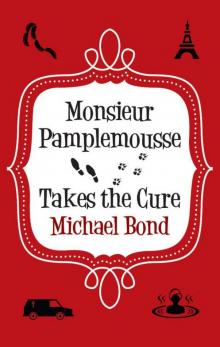 Monsieur Pamplemousse Takes the Cure
Monsieur Pamplemousse Takes the Cure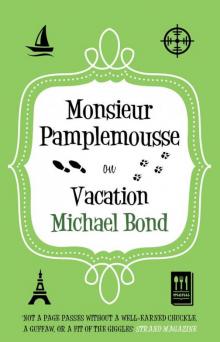 Monsieur Pamplemousse on Vacation
Monsieur Pamplemousse on Vacation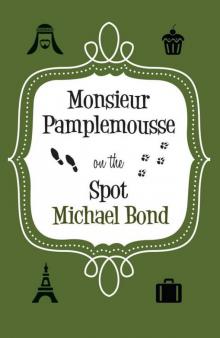 Monsieur Pamplemousse on the Spot
Monsieur Pamplemousse on the Spot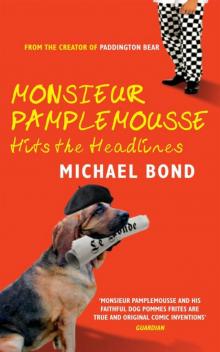 Monsieur Pamplemousse Hits the Headlines
Monsieur Pamplemousse Hits the Headlines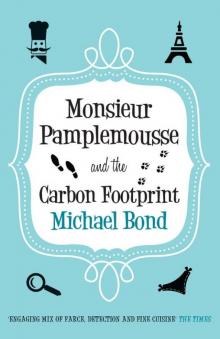 Monsieur Pamplemousse and the Carbon Footprint
Monsieur Pamplemousse and the Carbon Footprint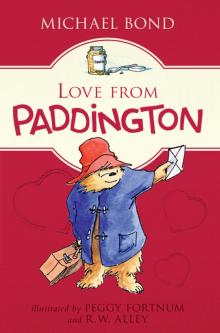 Love from Paddington
Love from Paddington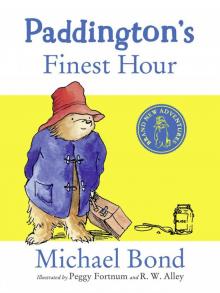 Paddington’s Finest Hour
Paddington’s Finest Hour Paddington Complete Novels
Paddington Complete Novels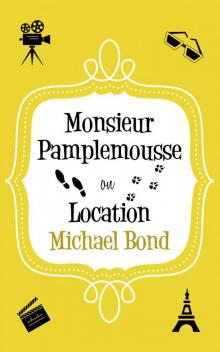 Monsieur Pamplemousse On Location
Monsieur Pamplemousse On Location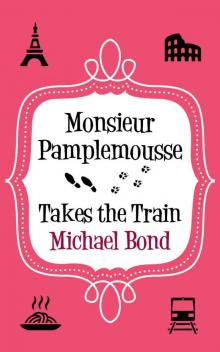 Monsieur Pamplemousse Takes the Train
Monsieur Pamplemousse Takes the Train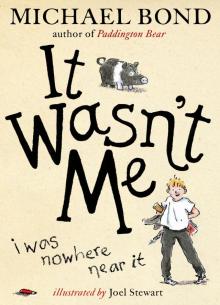 It Wasn’t Me!
It Wasn’t Me! Paddington Races Ahead
Paddington Races Ahead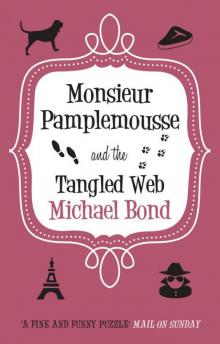 Monsieur Pamplemousse and the Tangled Web
Monsieur Pamplemousse and the Tangled Web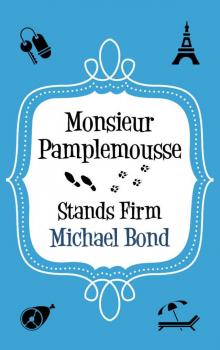 Monsieur Pamplemousse Stands Firm
Monsieur Pamplemousse Stands Firm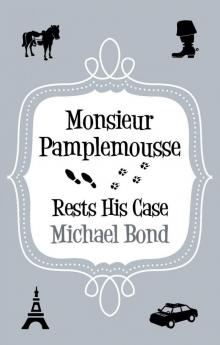 Monsieur Pamplemousse Rests His Case
Monsieur Pamplemousse Rests His Case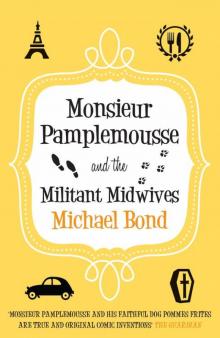 Monsieur Pamplemousse and the Militant Midwives
Monsieur Pamplemousse and the Militant Midwives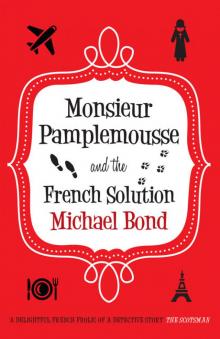 Monsieur Pamplemousse and the French Solution
Monsieur Pamplemousse and the French Solution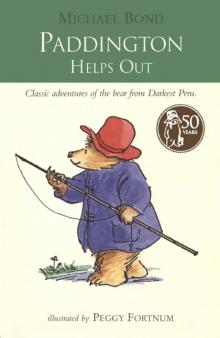 Paddington Helps Out
Paddington Helps Out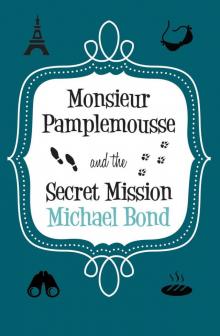 Monsieur Pamplemousse & the Secret Mission (Monsieur Pamplemousse Series)
Monsieur Pamplemousse & the Secret Mission (Monsieur Pamplemousse Series)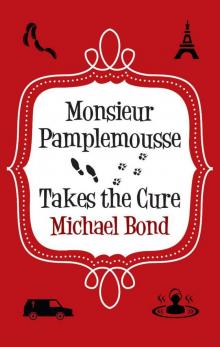 Monsieur Pamplemousse Takes the Cure (Monsieur Pamplemousse Series)
Monsieur Pamplemousse Takes the Cure (Monsieur Pamplemousse Series) A Bear Called Paddington
A Bear Called Paddington